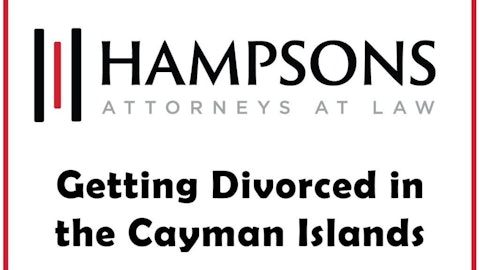
Divorce often raises fundamental questions about core family issues, including finances and children. Addressing these issues properly will have a significant impact on your future. Marital breakdown can often be accompanied by emotional distress. Having an understanding of the process and receiving legal advice on the implications can often lead to more productive outcomes.
Divorce in the Cayman Islands is primarily government by the Matrimonial Causes Act (2021 Revision). Unfortunately, in this jurisdiction ‘no fault divorce’ is not available. Instead, parties must establish one of the grounds for divorce, which include: –
In order to divorce in the Cayman Islands one of the parties must be domiciled here for 1 year, alternatively the wife can be habitually resident for 2 years. Even if parties were married here, the Cayman Islands does not have jurisdiction for divorce if they are not habitually resident/ domiciled.
Divorce is a 2-step process in a divorce and the court will first look to see if you have established the grounds. Afterwards the parties can turn to the substantive issues of children and finances. Importantly, this does not preclude the court dealing with matters on an emergency/ interim basis if necessary.
If parties have not been able to agree on children or financial issues themselves, the judge will refer them to mediation. Judicial Administration provides a free service to divorcing parties and attendance at an introductory meeting is mandatory. Settlement of these issues is often in the best interests of both adults and children and is strongly encouraged at all stages.
If parties cannot agree then the matter will have to be returned to a judge to decide. That process includes an exchange of written evidence and full disclosure of finances. If the issue revolves around children a social worker will be appointed to report to the court.
While instruction of an attorney is not mandatory, it is worth considering whether the short term financial saving could cost you more eventually. Divorce can be complex in many respects. Usually a judge will be mindful that a person is representing themselves and strive to ensure fairness, but he or she will have to strike a balance and cannot get too heavily involved in the process (for example by giving legal advice). A lay litigant can therefore be at a distinct disadvantage against an experienced attorney. We strongly recommend, therefore, that in the event of any matrimonial dispute that you seek out legal advice.
Whilst every effort has been made to ensure the accuracy of the information contained in this article, it has been provided for information purposes only and is not intended to constitute legal advice, and should not be taken as such. If you require legal advice, please contact us and arrange a consultation.
As attorneys in divorce and family matters we are frequently asked by our clients, “what about mediation?” and “can it help me in my divorce or maintenance application.”
Book a free 15-min consultation today.
Request a Consultation
With due care and attention, it should be possible to minimize the possibility of challenges to the validity of the will on each of these grounds under Cayman Islands law.
Litigation & Dispute Resolution 19 August 2022
Next to “what will it cost?” the question, “will I get my costs?”, is probably one of the most common questions that litigation lawyers deal with when advising clients.
Litigation & Dispute Resolution 19 August 2022
English courts following common law principles, applicable in the Cayman Islands, have recognized and enforced judgments of foreign courts since the 17th century.